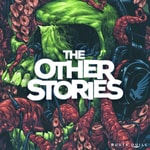The Science in The Fiction – Détails, épisodes et analyse
Détails du podcast
Informations techniques et générales issues du flux RSS du podcast.

The Science in The Fiction
Marty Kurylowicz and Holly Carson
Fréquence : 1 épisode/13j. Total Éps: 58

This is both a science and a science fiction podcast. We dig deep into the biggest ideas in science fiction, using science to elevate the conversation about sci-fi, and sci-fi to promote science education, curiosity and vision. We talk to science fiction authors about the science in their fiction, then talk to scientists about the same topic, and catalyze conversations between the two.
Classements récents
Dernières positions dans les classements Apple Podcasts et Spotify.
Apple Podcasts
🇨🇦 Canada - scienceFiction
30/06/2025#86🇨🇦 Canada - scienceFiction
29/06/2025#67🇨🇦 Canada - scienceFiction
18/06/2025#80🇨🇦 Canada - scienceFiction
17/06/2025#49🇨🇦 Canada - scienceFiction
15/06/2025#98🇨🇦 Canada - scienceFiction
14/06/2025#80🇨🇦 Canada - scienceFiction
06/06/2025#97🇬🇧 Grande Bretagne - scienceFiction
06/06/2025#82🇨🇦 Canada - scienceFiction
05/06/2025#65🇨🇦 Canada - scienceFiction
25/05/2025#86
Spotify
Aucun classement récent disponible
Liens partagés entre épisodes et podcasts
Liens présents dans les descriptions d'épisodes et autres podcasts les utilisant également.
See all- https://craphound.com/
45 partages
- https://twitter.com/MartyK5463
47 partages
- https://twitter.com/HeidiSevestre
2 partages
Qualité et score du flux RSS
Évaluation technique de la qualité et de la structure du flux RSS.
See allScore global : 68%
Historique des publications
Répartition mensuelle des publications d'épisodes au fil des années.
Ep 37: Peter Watts in Conversation with Justin Gregg - Part 2
Saison 2 · Épisode 37
jeudi 29 août 2024 • Durée 38:34
We continue the conversation between science fiction author Peter Watts and scientist Justin Gregg, and now they get down to the tricky business of discussing the nature of consciousness. We discuss Peter's premise of 'Blindsight – that consciousness is an illusory, unnecessary and possibly parasitic phenomenon that will get us all killed when we encounter more efficient, unconscious extra-terrestrial intelligence. Then very quickly agree that nobody knows what the hell they’re talking about when they try to understand consciousness: the pan-psychics may even be right that it’s a fundamental property of matter like mass, spin and charge. We discuss examples of unconscious but intelligent behaviour like sleepwalking killers and painters, we talk about acid trips, and the possible evolutionary advantages of consciousness in connection to memory. Peter suggests humans may not actually possess general intelligence and that we may be even dumber than large language models and the current incarnation of AI (as evidenced by flat earthers, anti-vaxxers and religious fundamentalists). And Justin promises to jello-wrestle an AI next time we get together!
Echopraxia (rifters.com)
https://www.rifters.com/
Blindsight (Watts novel) - Wikipedia
https://en.wikipedia.org/wiki/Blindsight_(Watts_novel)
Justin Gregg
https://www.justingregg.com/
If Nietzsche Were a Narwhal — Justin Gregg
https://www.justingregg.com/narwhal
Email:
[email protected]
Facebook:
https://www.facebook.com/groups/743522660965257/
Ep 36: Peter Watts in Conversation with Justin Gregg - Part 1
Saison 2 · Épisode 36
jeudi 15 août 2024 • Durée 49:29
In this episode we present a conversation between science fiction author Peter Watts and scientist Justin Gregg, following up on our individual interviews with each of them on the general theme of intelligence and consciousness. Justin Gregg is the author of ‘If Nietzsche were a Narwhal - What Animal Intelligence Reveals About Human Stupidity’, the book we spoke to him about in episode 23. Peter Watts is the science fiction author of 'Blindsight', 'Echopraxia', 'Starfish', 'Maelstrom', 'Behemoth' and many amazing short stories. We spoke to Peter in episodes 24 and 25 about his book ‘Blindsight’ and also about Justin Gregg’s book, and now we’ve put them in a room together for a very animated conversation with lots of banter and laughter. Peter discusses Justin’s book and Justin discusses Peter’s book, and they discover that they are pretty much twins separated at birth! We discuss AI, biology and evolution, the sweet spot for writing successful science fiction, Aphantasia, the secret of effective bullshit, manufactured memories and the extremely entertaining "yellow sponge hypothesis". So fasten your seatbelts kids, and get ready for two spectacularly interesting and intelligent people to light the house on fire.
Email:
[email protected]
Facebook:
https://www.facebook.com/groups/743522660965257/
Ep 27: Peter Gorniak and Cydney Nielsen on Artificial Intelligence and Virtual Reality in 'Stealing Worlds'
Saison 1 · Épisode 27
vendredi 19 avril 2024 • Durée 01:08:06
Marty sits down with his university pals Drs. Peter Gorniak and Cyndey Nielsen, to discuss Karl Schroeder's book 'Stealing Worlds'. As it happens, they both have PhD's and lifelong careers working in their fields of expertise - Peter in artificial intelligence and Cydney in data analytics and virtual/mixed reality, so they were the perfect people to bring their professional and personal perspectives to a discussion of Karl's book. We talk about where artificial intelligence and virtual reality were 20 years ago, where they are today, and what they might become in the future.
My Science Fiction — KarlSchroeder.com (kschroeder.com)
https://www.kschroeder.com/my-books
Email:
[email protected]
Facebook:
https://www.facebook.com/groups/743522660965257/
Ep 26: Karl Schroeder on Artificial Intelligence and Virtual Reality in 'Stealing Worlds'
Saison 1 · Épisode 26
jeudi 4 avril 2024 • Durée 01:04:15
Karl Schroeder is a science fiction author and foresight analyst. His fiction is known for both its scientific rigour and its visionary quality of bearing witness to what we can expect just around the corner – especially with his latest book 'Stealing Worlds'. This book is jam packed with big ideas about artificial intelligence (AI) and virtual reality (VR). We talk about the creation of LARPing worlds, i.e. Live Action Role Playing games within a virtual reality which can exist on top of and in parallel with the regular world. We also discuss more sophisticated versions of this called frame worlds, which have their own independent but virtually embedded economies. We chat about the oligarchic systems within our neoliberal catastrophe, think about invoking consensual hallucinations that are even better than money, and imagine how choosing your technology layer can translate to choosing your reality. We also discuss artificial intelligences that think they are eagles, or forests, and how to get them to act independently on behalf of beings who have not been able to represent themselves economically or politically - til now.
Science Fiction for the Crypto Age — KarlSchroeder.com (kschroeder.com)
https://www.kschroeder.com/
Karl Schroeder - Wikipedia
https://en.wikipedia.org/wiki/Karl_Schroeder
Stealing Worlds by Karl Schroeder | Goodreads
https://www.goodreads.com/en/book/show/41447722
Email:
[email protected]
Facebook:
https://www.facebook.com/groups/743522660965257/
Ep 25: Peter Watts (Part 2) on Intelligence and Consciousness in 'Blindsight'
Saison 1 · Épisode 25
jeudi 21 mars 2024 • Durée 58:06
In the second part of our interview with Peter Watts, we delve into his ideas about intelligence and consciousness. Does consciousness serve any function, or can all cognitive processes get along just fine without it? In his novel Blindsight, Peter postulates a hostile entity whose intelligence outcompetes our own, because it is not weighed down by the slow, clunky machinery of sapience. But his thinking has evolved in recent years, to concede the possible primacy of consciousness, and heck, even the existence of a soul! Along the way we talk about a blob of cells called dish-brain that taught itself to play pong. We contemplate energy minimization, integrated information and even pan-psychic theories of consciousness. We ask how far down the chain of being sentience might reach, and ultimately admit we have no idea how a lump of meat can wake up to ask questions about the nature of its own awareness.
Email:
[email protected]
Facebook:
https://www.facebook.com/groups/743522660965257/
Ep 24: Peter Watts (Part 1) on Intelligence and Consciousness in 'If Nietzsche Were a Narwhal'
Saison 1 · Épisode 24
jeudi 14 mars 2024 • Durée 51:02
We talk to acclaimed science fiction author Peter Watts about Justin Gregg's book 'If Nietzsche Were a Narwhal'. We ask if the human flavour of intelligence is maladaptive, and other creatures are smarter because they are so well adapted to their evolutionary niche - or are we comparing apples with moon rocks? Ultimately, the question is whether the animal wisdom of bedbugs and crocodilians is going to get them off this planet when the sun goes supernova. Peter expresses his opinion that human intelligence is actually special in this regard. The problems we create with our technological intelligence are due to our minds still being shackled to animal instincts, and if we are to solve our problems we may need to escape from the evolutionary constraints under which our minds evolved.
Echopraxia (rifters.com)
https://www.rifters.com/
Peter Watts (author) - Wikipedia
https://en.wikipedia.org/wiki/Peter_Watts_(author)
Email:
[email protected]
Facebook:
https://www.facebook.com/groups/743522660965257/
Ep 23: Justin Gregg on Intelligence and Consciousness in 'If Nietzsche Were a Narwhal'
Saison 1 · Épisode 23
jeudi 29 février 2024 • Durée 58:59
Marty and Holly sit down with zoologist Justin Gregg to discuss his book 'If Nietzsche Were a Narwhal: What Animal Intelligence Reveals About Human Stupidity'. We discuss which aspects of human intelligence (and stupidity) are unique in the animal world, and what sets our mental faculties apart from those of other animals. We talk about our capacity for causal reasoning, the creation of language and our ability to lie, to imagine our own death, and to create moral frameworks to guide our behaviour. We also contemplate the phenomenon of consciousness and self awareness, and discuss how the subjective experience might arise in other organisms, from insects to primates. Finally we examine 'prognostic myopia', our short-sighted inability to plan for long-term problems, and the consequences for our species and our planet.
Justin Gregg
https://www.justingregg.com/
If Nietzsche Were a Narwhal — Justin Gregg
https://www.justingregg.com/narwhal
Email:
[email protected]
Facebook:
https://www.facebook.com/groups/743522660965257/
Ep 22: Heidi Sevestre on Geoengineering in Kim Stanley Robinson's 'The Ministry For The Future'
Saison 1 · Épisode 22
jeudi 15 février 2024 • Durée 56:56
Marty and Holly sit down with Dr. Heidi Sevestre for a conversation about climate change and geoengineering, as portrayed in The Ministry For The Future by Kim Stanley Robinson. Dr. Sevestre is a glaciologist who is leading the call to action on climate change through her research and education initiatives. We talk about her recent expedition to Svalbard with Climate Sentinels, a zero-emission research expedition on skis to understand the impact of black soot on the melting of glaciers. We also discuss her recent expedition to film a National Geographic documentary (Arctic Ascent) about the surging glaciers in Greenland, gathering unprecedented data with the help of NASA technology and some of the world's best climbers (Alex Honnold, Hazel Findlay, Aldo Kane, Mikey Schaefer, Adam Kjeldsen). Then we get into the nuts and bolts of some of the geoengineering proposals in The Ministry For The Future, and bring Dr. Sevestre’s perspective as a working climate scientist on how to make the best use of our resources and the time we have left to halt and reverse the trajectory we are on. We discuss pumping out the lubricating layer under glaciers to prevent them from dropping into the ocean and raising sea levels catastrophically. We talk about dying the arctic ocean yellow, sending sulphates into the upper atmosphere or spreading reflective beads over the arctic. It seems that if our civilization and species is going to survive, it’s going to take a lot of bottom-up solutions and the collective action of our next few generations on this planet. While attempts at solar radiation management on a global scale will likely cause more harm then good, major carbon sequestration projects will be needed. And it may be that the most effective way to capture carbon will be to create more forests and wetlands, saving the world by re-wilding the world; our best solutions may come from ecological engineering rather than geoengineering.
Home | Dr. Heïdi Sevestre Glaciologist (heidisevestre.com)
https://www.heidisevestre.com/
Climate Sentinels | Hurtigruten Group
https://www.hurtigruten.com/group/foundation/projects/climate-sentinels/
Dr. Heïdi Sevestre (@HeidiSevestre) / X (twitter.com)
https://twitter.com/HeidiSevestre
Dr. Heïdi Sevestre (@heidisevestre) • Instagram photos and videos
https://www.instagram.com/heidisevestre/?hl=en
The Ministry for the Future - Wikipedia
https://en.wikipedia.org/wiki/The_Ministry_for_the_Future
KimStanleyRobinson.info | The reference site for Kim Stanley Robinson
https://www.kimstanleyrobinson.info/
Email:
[email protected]
Facebook:
https://www.facebook.com/groups/743522660965257/
Ep 21: Kim Stanley Robinson on Geoengineering in 'The Ministry For The Future'
Saison 1 · Épisode 21
jeudi 1 février 2024 • Durée 01:09:19
In this episode we are super excited to present our conversation with Kim Stanley Robinson, one of the greatest science fiction writers of all time, whose legacy will surely last deep into our sci-fi future. We discuss his latest book The Ministry for the Future, and some of the many extraordinary ideas in that book for getting humanity through to the other side of the climate crisis. We focus our conversation on various geoengineering projects as well as innovations in economics and monetary policy that will help us get there. We discuss green investment, the merits of non-ideological rhetoric, strategies for managing our carbon over-shoot, and the efficacy of imitating natural processes in both solar radiation management and carbon sequestration. We go into detail about pumping out the lubricating layer of water beneath the world's glaciers in order to stop them from sliding into the ocean, thereby mediating the acceleration of rising sea levels. We also talk about the impracticality of launching solar shades into space to cool down the planet. Finally, we get to ask Stan if he was ever consulted or paid by the Foundation TV series for lifting his iconic space elevator scene from Red Mars, and plonking it into their pilot episode; the answer is no, but he's cool with it.
KimStanleyRobinson.info | The reference site for Kim Stanley Robinson
https://www.kimstanleyrobinson.info/
Kim Stanley Robinson - Wikipedia
https://en.wikipedia.org/wiki/Kim_Stanley_Robinson
https://www.facebook.com/kimstanleyrobinson/
The Ministry for the Future - Wikipedia
https://en.wikipedia.org/wiki/The_Ministry_for_the_Future
The Ministry for the Future by Kim Stanley Robinson | Goodreads
https://www.goodreads.com/en/book/show/50998056
Email:
[email protected]
Facebook:
https://www.facebook.com/groups/743522660965257/
Ep 20: Tim Swindle on Planetary Protection in the OSIRIS-REx Mission and 'The Andromeda Strain'
Saison 1 · Épisode 20
jeudi 18 janvier 2024 • Durée 01:03:30
This conversation was a great example of what we’re trying to do with this podcast, the perfect balance between Science and Science Fiction. Marty sits down with Dr. Tim Swindle to discuss The Andromeda Strain by Michael Crichton and The Andromeda Evolution by Daniel H. Wilson, in relation to NASA's OSIRIS REx mission which has returned a sample of Asteroid Bennu to Earth, as well as the upcoming Mars Sample Return mission. Dr. Swindle is a professor emeritus from the University of Arizona who specializes is radiometric chronology, which makes it possible measure the ages of very old things in space and on earth by characterizing the relative balance of various radio-isotopes, much like Carbon dating but with different atoms like Potassium and Argon. We discuss the natural exchange of material between all the bodies in our solar system and maybe even other solar systems, and reflect on the possibility that the genesis of life may be a collective effort of molecules created in various places across the solar system. We learn about meteors and cosmic dust and how they can penetrate our atmosphere to land on Earth without burning up. We also speculate about the likely carbon-based composition of extraterrestrial life if ever we find it, and the likelihood that life which evolved in a radically different extra-terrestrial environment could not harm the life that has evolved on Earth.
Timothy Swindle | Lunar and Planetary Laboratory & Department of Planetary Sciences | The University of Arizona:
https://www.lpl.arizona.edu/faculty/swindle
OSIRIS-REx - NASA Science:
https://science.nasa.gov/mission/osiris-rex/
The Andromeda Strain - Wikipedia:
https://en.wikipedia.org/wiki/The_Andromeda_Strain
The Andromeda Evolution - Wikipedia:
https://en.wikipedia.org/wiki/The_Andromeda_Evolution
The Andromeda Evolution (Andromeda, #2) by Daniel H. Wilson | Goodreads:
https://www.goodreads.com/book/show/44148860-the-andromeda-evolution
Email:
[email protected]
Facebook:
https://www.facebook.com/groups/743522660965257/








